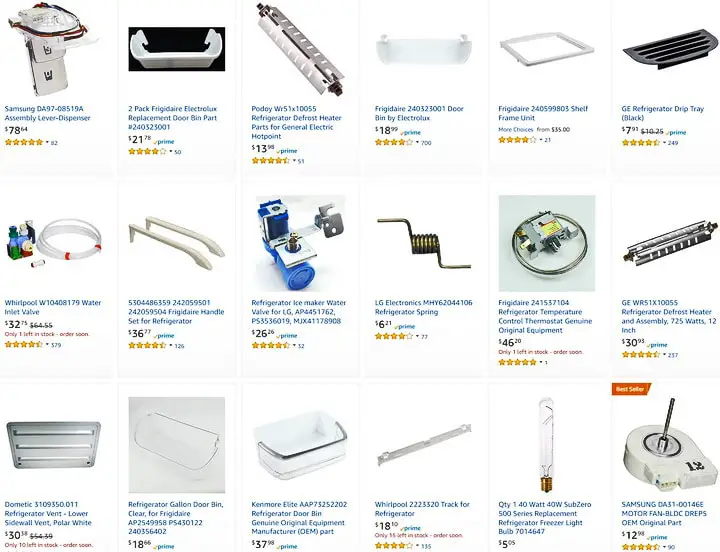Refrigerator Is Not Cold Enough. When your refrigerator is not as cold as it should be, it could be a number of things causing the problem. Let’s look at some easy ways to check to see why your fridge is not cold enough. It may be an easy simple fix, so lets try 8 simple things to do or check on your fridge before calling the refrigerator appliance technician.
If you follow the easy 8 steps below, you may get it to be cold again. If not there are technically detailed pages on RemoveandReplace.com to fix a fridge that is not cold enough. Either way, try the easy steps below that are often overlooked and see if it fixes your fridge and gets it cold once again. Also, check out the videos on the bottom of this page as they may also help you in a highly detailed way to troubleshoot your fridge not being cold enough.
8 Easy Tips To Try When Your Refrigerator Is Not Cold Enough
Easy Troubleshooting Before Calling Appliance Technician
1) Check the Power Plug
The one thing that holds true for every home appliance is the need for electricity. Without it, your fridge can’t run the compressor and therefore can’t keep your food cold. If things seem unusually warm, just take a quick peek behind your refrigerator and confirm that the plug is still in the wall. To be sure, reach back and make sure it’s secure and fully pressed in. Sometimes an accidental kick or tug can pull the plug out just enough that it loses connection to your home grid but still looks like it’s in place.
2) Adjust the Thermostat
Another common refrigerator mistake is nudging the thermostat. This can be easy to do when your rummaging around for ingredients or leftovers or wiping down the inside of the fridge to keep it nice and tidy. If the thermostat has been bumped to a higher than desirable temperature, this is the easiest possible fix. Simply set it all the way back down or to your favorite setting and the fridge should return to its usual cooling behaviors.
3) Clear the Vents Inside
Proper air circulation is vital to the cooling process of a refrigerator, and that means air needs to get into the compartments as well as out the back where the compressor lives. Find the vents in both your freezer and refrigerator sections and make sure there are no boxes or bags of food in the way. Try to keep these areas clear in the future as well to assure the optimal performance of your refrigerator.
4) Clean the Mechanism Underneath
While the vast majority of a refrigerator is storage and insulation, the important part is underneath. The compressor, coils, and fan are all vital to the cooling process but they can get pretty grungy along with everything else underneath your fridge. Temporarily turn your fridge off and wipe the dust out of the components in the nether regions of your refrigerator in order to boost performance. Once you see all the dust down there, you might not be surprised that the fridge was having a little trouble. Don’t forget to turn the fridge back on when you’re done.
5) Wipe and Inspect the Door Gaskets
Just like the weather stripping for your house, your refrigerator needs to be sealed in order to get cold and stay that way. Otherwise, all its cooling effort will leak into the home instead of keeping your food cold. Your refrigerator relies on the rubber door gasket which lines the inner edge of the fridge and freezer doors. This can get warped, dirty in a way that prevents a seal, moldy due to excess moisture, or damaged. If you see visible signs of damage, you’ll want to replace the gasket. Otherwise, simply wipe it down with a diluted bleach solution.
6) Create More Air Space in the Fridge
The freezer benefits from being packed but your fridge needs space for cold air to move around your food items. For this reason, if you pack your fridge too tightly with food boxes and tupperware, the entire set may have difficulty getting cold. Make sure that about 2/3 of your actual fridge space (usually above the shelves) is clear for airflow.
7) Clear the Freezer-to-Fridge Vents
One of the ways that refrigerator units improve their own efficiency is to use some of the cold from the freezer to cool the fridge section. This is done by way of vents which, if your freezer is particularly icy, can ice over and prevent cool are from being blown through. If your fridge model has these vents, locate them and make sure they are clear of ice.
8) Inspect Your Door Switch
Finally, the answer might not even be about your cooling system at all. Most refrigerators intelligently stop actively cooling when the door is open in order to maintain efficiency. It knows by using a simple button or switch that is pushed down when the door is closed and springs up when the door is open. If your door switch is malfunctioning, your fridge may not reliably be switching back to cooling. You can test this by pressing the switch with the door open to see if the light goes off.
NOTE: If you find you need to replace a part on your refrigerator,
see the image below for more information on parts to fix your fridge.
Refrigerator Not Cooling – What to Check
Refrigerator Not Cooling – Evaporator Fan Not Working
Troubleshooting Evaporator Fan Problems in Refrigerators
How to repair Refrigerator Freezer Not Cold Enough – Troubleshooting Heater Element
Five Most Common Problems With Refrigerators
If you notice that your refrigerator is no longer getting cold enough, it’s important to diagnose the problem and find a solution quickly, otherwise, all your perishable foods will be at risk of spoilage. Be sure to find a solution yourself or call for repairs within 24 hours and try to keep the fridge closed until it is able to generate cold again. For more helpful home repair tips please contact us below today.





Leave a Reply